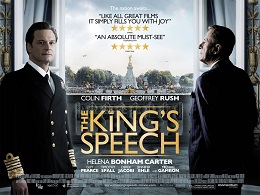The King's Speech
The King's Speech is a British historical drama film released in 2010, directed by Tom Hooper and written by David Seidler. The film stars Colin Firth as King George VI, who struggles to overcome his stammer with the help of Lionel Logue, an Australian speech therapist played by Geoffrey Rush. Helena Bonham Carter plays Queen Elizabeth, the King's wife. The narrative focuses on the King's efforts to communicate effectively with his subjects, particularly through radio broadcasts during the early years of his reign and the onset of World War II.
Plot[edit | edit source]
The story begins in 1925 with Prince Albert, Duke of York (later King George VI), suffering from a severe stammer. His public speaking difficulties are evident during a closing speech at the Empire Exhibition at Wembley Stadium. After several unsuccessful attempts to cure his stammer, his wife, Elizabeth, persuades him to see Lionel Logue, an unconventional Australian speech therapist. Despite a rocky start, a deep bond develops between the two men. With Logue's help, the Duke confronts the psychological issues behind his stammer and gains the confidence to speak publicly without stuttering, particularly during Britain's declaration of war on Germany in 1939.
Cast[edit | edit source]
- Colin Firth as King George VI
- Geoffrey Rush as Lionel Logue
- Helena Bonham Carter as Queen Elizabeth
- Guy Pearce as King Edward VIII
- Timothy Spall as Winston Churchill
- Derek Jacobi as Archbishop Cosmo Lang
- Jennifer Ehle as Myrtle Logue
- Michael Gambon as King George V
Production[edit | edit source]
The idea for The King's Speech originated from David Seidler, who also had a stammer as a child and was inspired by King George VI's speeches. Seidler's research included reading books and viewing footage from the era, and he eventually wrote the screenplay after obtaining the necessary permissions from the King's estate. Directed by Tom Hooper, the film was shot in various locations across the United Kingdom, including London and Yorkshire. The production design aimed to authentically recreate the period, paying close attention to historical details in costumes, sets, and locations.
Reception[edit | edit source]
The King's Speech received widespread critical acclaim, particularly for its screenplay, direction, and the performances of its lead actors. Colin Firth's portrayal of King George VI earned him an Academy Award for Best Actor. The film also won Oscars for Best Picture, Best Director for Tom Hooper, and Best Original Screenplay for David Seidler. It was praised for its humanizing portrayal of the monarchy and its inspirational story of overcoming personal adversity.
Themes[edit | edit source]
The film explores themes of duty, friendship, and the power of communication. It delves into the personal struggles of a monarch who must overcome his speech impediment to lead his country through turbulent times. The relationship between King George VI and Lionel Logue is central to the narrative, highlighting the importance of trust and friendship in overcoming personal challenges.
Legacy[edit | edit source]
The King's Speech has been credited with bringing attention to the challenges faced by individuals with speech impediments and the role of speech therapy in helping them. It has also sparked interest in the history of the British monarchy, particularly during the early 20th century.
Search WikiMD
Ad.Tired of being Overweight? Try W8MD's physician weight loss program.
Semaglutide (Ozempic / Wegovy and Tirzepatide (Mounjaro / Zepbound) available.
Advertise on WikiMD
|
WikiMD's Wellness Encyclopedia |
| Let Food Be Thy Medicine Medicine Thy Food - Hippocrates |
Translate this page: - East Asian
中文,
日本,
한국어,
South Asian
हिन्दी,
தமிழ்,
తెలుగు,
Urdu,
ಕನ್ನಡ,
Southeast Asian
Indonesian,
Vietnamese,
Thai,
မြန်မာဘာသာ,
বাংলা
European
español,
Deutsch,
français,
Greek,
português do Brasil,
polski,
română,
русский,
Nederlands,
norsk,
svenska,
suomi,
Italian
Middle Eastern & African
عربى,
Turkish,
Persian,
Hebrew,
Afrikaans,
isiZulu,
Kiswahili,
Other
Bulgarian,
Hungarian,
Czech,
Swedish,
മലയാളം,
मराठी,
ਪੰਜਾਬੀ,
ગુજરાતી,
Portuguese,
Ukrainian
Medical Disclaimer: WikiMD is not a substitute for professional medical advice. The information on WikiMD is provided as an information resource only, may be incorrect, outdated or misleading, and is not to be used or relied on for any diagnostic or treatment purposes. Please consult your health care provider before making any healthcare decisions or for guidance about a specific medical condition. WikiMD expressly disclaims responsibility, and shall have no liability, for any damages, loss, injury, or liability whatsoever suffered as a result of your reliance on the information contained in this site. By visiting this site you agree to the foregoing terms and conditions, which may from time to time be changed or supplemented by WikiMD. If you do not agree to the foregoing terms and conditions, you should not enter or use this site. See full disclaimer.
Credits:Most images are courtesy of Wikimedia commons, and templates, categories Wikipedia, licensed under CC BY SA or similar.
Contributors: Prab R. Tumpati, MD






